 This circular narrative by Jamaica Kincaid takes the form of a dream in which the narrator, woken by her doorbell and finding no one there, embarks upon a surreal journey. An interesting aspect of the story is that although delivered in the first person, the narrator’s identity is neither given nor defined. When asked the titular question by an unknown woman, she gives a slightly different version of the journey so far, suggesting either personal growth (greater awareness), or that she has experienced multiple iterations of the journey. Themes include reality vs. fantasy, loss and longing, motherhood, personal growth, identity. More…
This circular narrative by Jamaica Kincaid takes the form of a dream in which the narrator, woken by her doorbell and finding no one there, embarks upon a surreal journey. An interesting aspect of the story is that although delivered in the first person, the narrator’s identity is neither given nor defined. When asked the titular question by an unknown woman, she gives a slightly different version of the journey so far, suggesting either personal growth (greater awareness), or that she has experienced multiple iterations of the journey. Themes include reality vs. fantasy, loss and longing, motherhood, personal growth, identity. More…
Category Archives: Quick Reads
I Could See the Smallest Things
 The title of this story by Raymond Carver is somewhat ironic. When protagonist Nancy looks out her bedroom window, she can see the smallest of things. What she can’t see or won’t acknowledge are the big things in her life that need attention. Concern about her open gate and multiple references to fences symbolize three important themes: insecurity, alienation, and fear of the outside world and/or change. Neighbor Sam’s garden pests represent another: inertia (sluggishness). Sam has moved on from his problems in life; Nancy and husband Cliff have not. Other themes: alcohol abuse, regret, emptiness and lack of fulfilment. More…
The title of this story by Raymond Carver is somewhat ironic. When protagonist Nancy looks out her bedroom window, she can see the smallest of things. What she can’t see or won’t acknowledge are the big things in her life that need attention. Concern about her open gate and multiple references to fences symbolize three important themes: insecurity, alienation, and fear of the outside world and/or change. Neighbor Sam’s garden pests represent another: inertia (sluggishness). Sam has moved on from his problems in life; Nancy and husband Cliff have not. Other themes: alcohol abuse, regret, emptiness and lack of fulfilment. More…
The Japanese Quince
 The message of this story by John Galsworthy can be summarized in the English idiom “stop and smell the roses”. The protagonist and his doppelganger neighbor are so caught up in their daily routines that they not only fail to notice the beauty around them, but also lead solitary, unfulfilled lives alienated from those outside their immediate circle. The titular quince, with its refreshing fragrance and colorful blossoms, symbolizes rebirth. The blackbird’s song represents the potential joy of life that eludes them. Themes: the beauty of nature, work/life balance, alienation, lack of fulfillment/inner emptiness, appearance, social anxiety. More…
The message of this story by John Galsworthy can be summarized in the English idiom “stop and smell the roses”. The protagonist and his doppelganger neighbor are so caught up in their daily routines that they not only fail to notice the beauty around them, but also lead solitary, unfulfilled lives alienated from those outside their immediate circle. The titular quince, with its refreshing fragrance and colorful blossoms, symbolizes rebirth. The blackbird’s song represents the potential joy of life that eludes them. Themes: the beauty of nature, work/life balance, alienation, lack of fulfillment/inner emptiness, appearance, social anxiety. More…
The Princess and the Tin Box
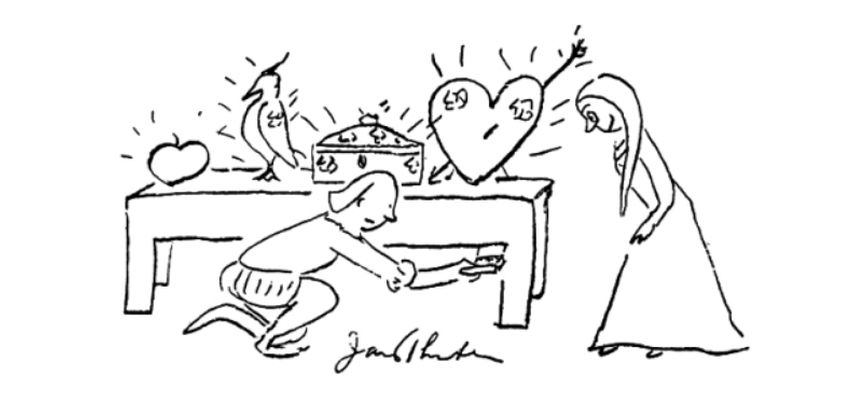 In addition to famous short stories such as The Secret Life of Walter Mitty and The Cat-Bird Seat, humorist James Thurber authored numerous “fables for our time”. Many of these satirize the fable/fairy-tale form and, in so doing, provide commentary on aspects of modern society. In this story, a king decrees that he will give his spoiled daughter’s hand in marriage to the prince who brings her the gift she likes the most. Readers are left wondering whether she makes the right choice. Themes: parental pressure/expectations, materialism vs. romantic love, realistic vs. “fairy tale” endings. More…
In addition to famous short stories such as The Secret Life of Walter Mitty and The Cat-Bird Seat, humorist James Thurber authored numerous “fables for our time”. Many of these satirize the fable/fairy-tale form and, in so doing, provide commentary on aspects of modern society. In this story, a king decrees that he will give his spoiled daughter’s hand in marriage to the prince who brings her the gift she likes the most. Readers are left wondering whether she makes the right choice. Themes: parental pressure/expectations, materialism vs. romantic love, realistic vs. “fairy tale” endings. More…
The Kitemaker
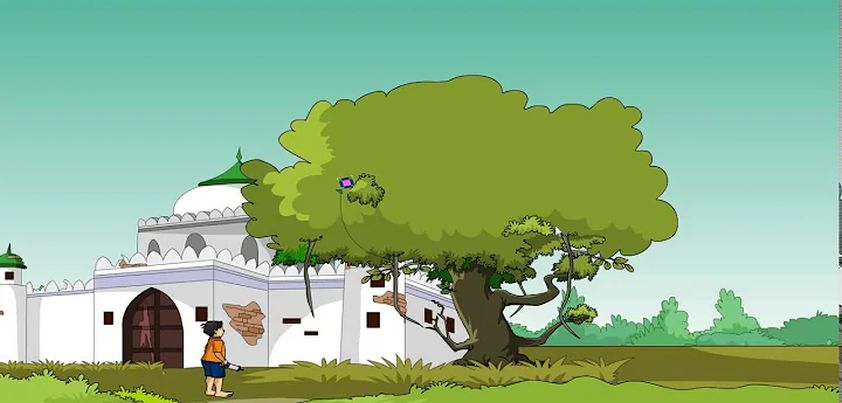 The major themes of this Ruskin Bond story are change and the isolation/loneliness of the aged. An old man in a once rural Indian village lays back and reflects on his life as a professional kitemaker and how much the world has changed. The village’s traditional social structure, sport of adult kite flying, open spaces, and once close community spirit are no more. His only joy in life is spending time with and making kites for his grandson. A torn kite carried by the wind far above the city symbolizes release of his soul. Other themes: tradition, nostalgia, pride, mortality. More…
The major themes of this Ruskin Bond story are change and the isolation/loneliness of the aged. An old man in a once rural Indian village lays back and reflects on his life as a professional kitemaker and how much the world has changed. The village’s traditional social structure, sport of adult kite flying, open spaces, and once close community spirit are no more. His only joy in life is spending time with and making kites for his grandson. A torn kite carried by the wind far above the city symbolizes release of his soul. Other themes: tradition, nostalgia, pride, mortality. More…
The Grasshopper and the Bell Cricket
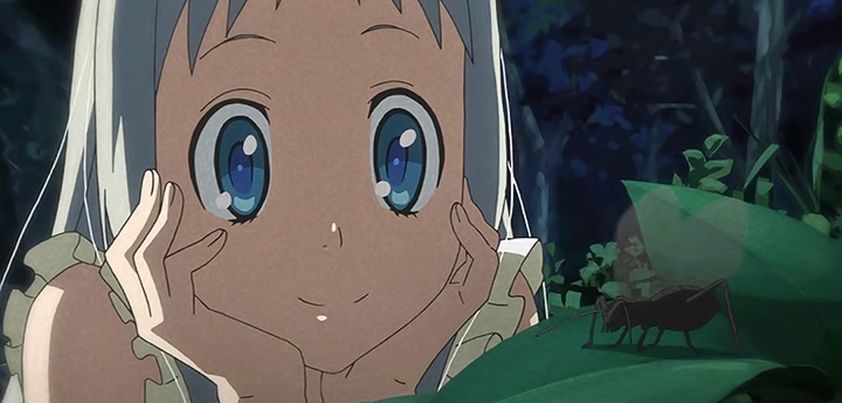 In understanding this story from Yasunari Kawabata, it is important to know that in Japan, grasshoppers are considered common insects whilst bell crickets are highly prized because of each male’s unique cry. In calling out Does anyone want a grasshopper? several times until Kiyoko responds, Fujio signals that he knows which of the two he has caught and who he wants to give it to. To me, the major themes of the story are love and perception: what some may mistake for a grasshopper, others will recognize as a bell cricket (and vice-versa!). Other themes: childhood innocence, individualism, destiny, beauty. More…
In understanding this story from Yasunari Kawabata, it is important to know that in Japan, grasshoppers are considered common insects whilst bell crickets are highly prized because of each male’s unique cry. In calling out Does anyone want a grasshopper? several times until Kiyoko responds, Fujio signals that he knows which of the two he has caught and who he wants to give it to. To me, the major themes of the story are love and perception: what some may mistake for a grasshopper, others will recognize as a bell cricket (and vice-versa!). Other themes: childhood innocence, individualism, destiny, beauty. More…
Four O’clock
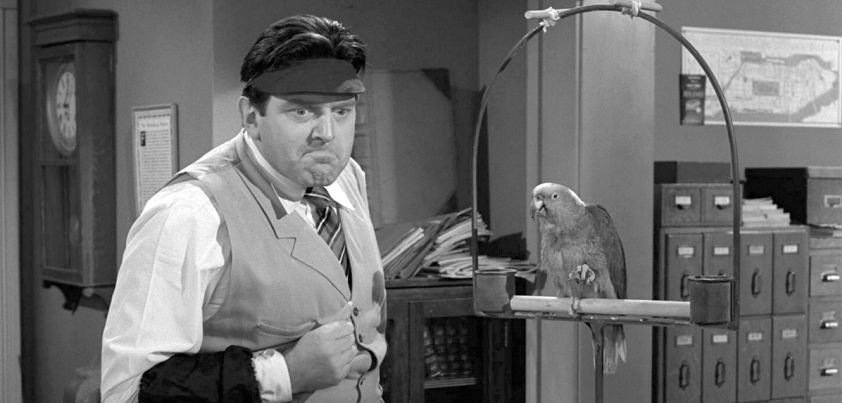 This is the one notable short story from award-winning journalist Price Day. A seemingly ordinary man has been given a series of “special powers” that could benefit mankind. He is too slow in using the first two (the power to ground war planes and prevent road accidents), and is determined not to do the same with the third: the ability to change evil people all over the world in a way that makes them easily identifiable. When he tries to do this, things don’t go according to plan. Themes: moral superiority, tempting fate (be careful what you wish for!), karma. More…
This is the one notable short story from award-winning journalist Price Day. A seemingly ordinary man has been given a series of “special powers” that could benefit mankind. He is too slow in using the first two (the power to ground war planes and prevent road accidents), and is determined not to do the same with the third: the ability to change evil people all over the world in a way that makes them easily identifiable. When he tries to do this, things don’t go according to plan. Themes: moral superiority, tempting fate (be careful what you wish for!), karma. More…
There Was Once
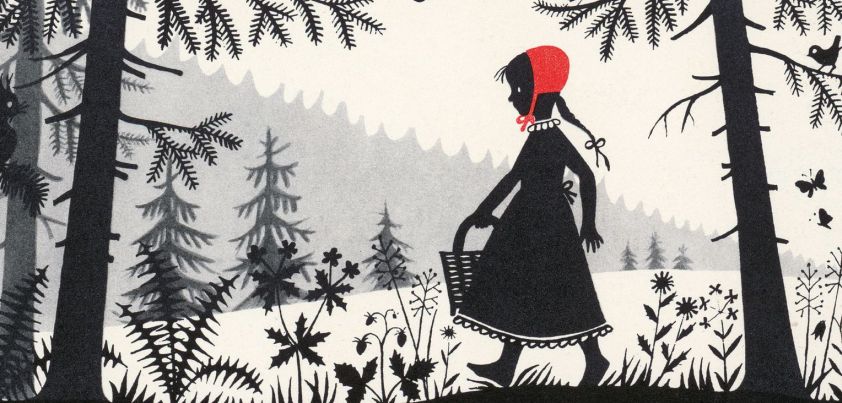 This humorous vignette from Margaret Atwood uses satire to not only highlight the frequent use of stereotypes in children’s stories, but also draw attention to the modern-day obsession with political correctness. A storyteller is humiliated into whittling his twenty-four-word opening sentence down to just one, and then changing it. This illustrates how, taken to extremes, almost anything one says has the potential to offend someone. Atwood’s message is that literature, the performing arts, news reporting and free speech as we know them would be impossible under such constraints. Themes: storytelling, stereotyping, political correctness, freedom of expression. More…
This humorous vignette from Margaret Atwood uses satire to not only highlight the frequent use of stereotypes in children’s stories, but also draw attention to the modern-day obsession with political correctness. A storyteller is humiliated into whittling his twenty-four-word opening sentence down to just one, and then changing it. This illustrates how, taken to extremes, almost anything one says has the potential to offend someone. Atwood’s message is that literature, the performing arts, news reporting and free speech as we know them would be impossible under such constraints. Themes: storytelling, stereotyping, political correctness, freedom of expression. More…
Anxiety
 In this story from Grace Paley’s activist period, an elderly woman worries about everything from the imminent destruction of the world to the well-being of two children being walked home from school. A father’s shortness with one of the children prompts the woman to call him out. She begins with the alarmist suggestion that people should enjoy life less and think more about the coming doom. She then elicits the cause of the man’s anger (wounded pride), which seems petty compared to the issues she has just raised. Themes: anxiety, global threats, fatherhood, child innocence, adult indifference. More…
In this story from Grace Paley’s activist period, an elderly woman worries about everything from the imminent destruction of the world to the well-being of two children being walked home from school. A father’s shortness with one of the children prompts the woman to call him out. She begins with the alarmist suggestion that people should enjoy life less and think more about the coming doom. She then elicits the cause of the man’s anger (wounded pride), which seems petty compared to the issues she has just raised. Themes: anxiety, global threats, fatherhood, child innocence, adult indifference. More…
The Awful Fate of Melpomenus Jones
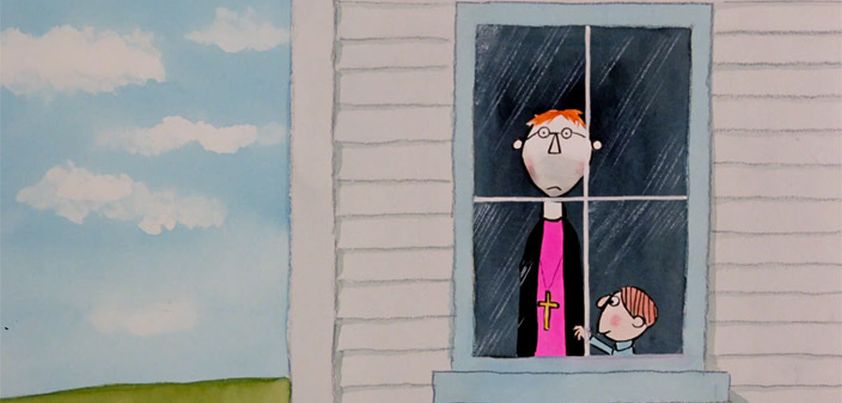 Stephen Leacock’s The Awful Fate of Melpomenus Jones takes a sarcastic look at the themes of shyness and polite social conventions. Many readers mistakenly associate Melpomenus’s refusal to give a false reason to leave the house with his being a clergyman. Not so! In the introduction, we are told the young curate was too modest (shy) to tell a lie. His downfall is because of shyness, not honesty. The absurd outcome is as much the over-polite hosts’ fault as it is Melpomenus’s. If anyone was responsible for his spirit rushing from the house like a hunted cat, it was them. More…
Stephen Leacock’s The Awful Fate of Melpomenus Jones takes a sarcastic look at the themes of shyness and polite social conventions. Many readers mistakenly associate Melpomenus’s refusal to give a false reason to leave the house with his being a clergyman. Not so! In the introduction, we are told the young curate was too modest (shy) to tell a lie. His downfall is because of shyness, not honesty. The absurd outcome is as much the over-polite hosts’ fault as it is Melpomenus’s. If anyone was responsible for his spirit rushing from the house like a hunted cat, it was them. More…
Like the Sun
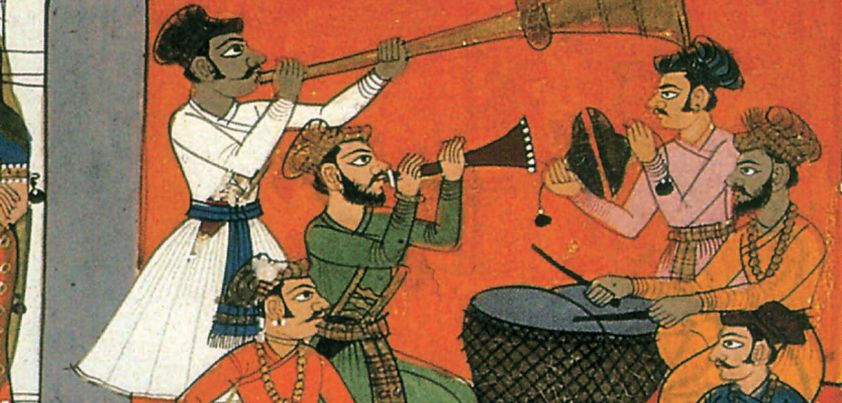 This story by R. K. Narayan begins with some strange logic. After observing that relationships involve tempering truth so as not to hurt one another, the protagonist adds that life is not worth living without telling nothing but the truth (i.e. potentially hurting people) at least one day each year. On one of these days, his honesty upsets three people. The first two are needlessly hurt; the third, although unhappy, benefits from his frankness. The story shows that truth is indeed like the sun: most of the time warm and nourishing, but also capable of causing serious damage. More…
This story by R. K. Narayan begins with some strange logic. After observing that relationships involve tempering truth so as not to hurt one another, the protagonist adds that life is not worth living without telling nothing but the truth (i.e. potentially hurting people) at least one day each year. On one of these days, his honesty upsets three people. The first two are needlessly hurt; the third, although unhappy, benefits from his frankness. The story shows that truth is indeed like the sun: most of the time warm and nourishing, but also capable of causing serious damage. More…
Half a Day
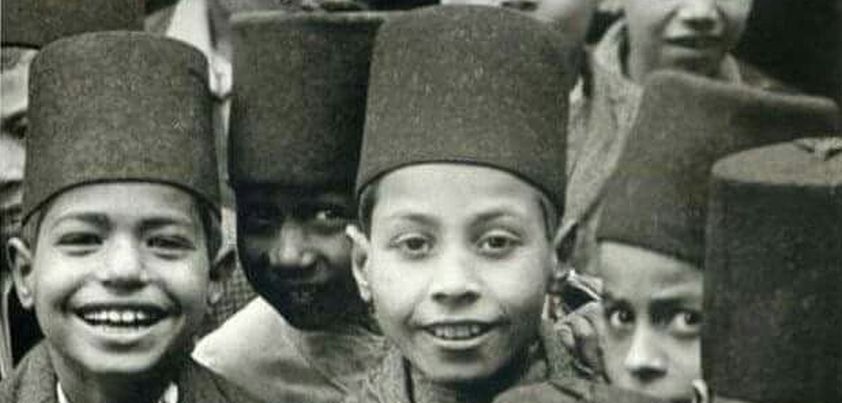 This thought-provoking story from Naguib Mahfouz is an allegory of the phases and brevity of life. An old man’s nostalgic description of his first day at school triggers a stream of associated memories. He recalls completing his schooling and going on to experience friendship and love as if this all took place the same day. He then imagines setting out alone on a mystical journey “home”. Changes in the social and urban environments cause him to lose his way, and he becomes increasingly anxious to reach his destination and seek explanations (enlightenment?) from his “father”. Themes: time, memory, aging, change. More…
This thought-provoking story from Naguib Mahfouz is an allegory of the phases and brevity of life. An old man’s nostalgic description of his first day at school triggers a stream of associated memories. He recalls completing his schooling and going on to experience friendship and love as if this all took place the same day. He then imagines setting out alone on a mystical journey “home”. Changes in the social and urban environments cause him to lose his way, and he becomes increasingly anxious to reach his destination and seek explanations (enlightenment?) from his “father”. Themes: time, memory, aging, change. More…
The War Prayer
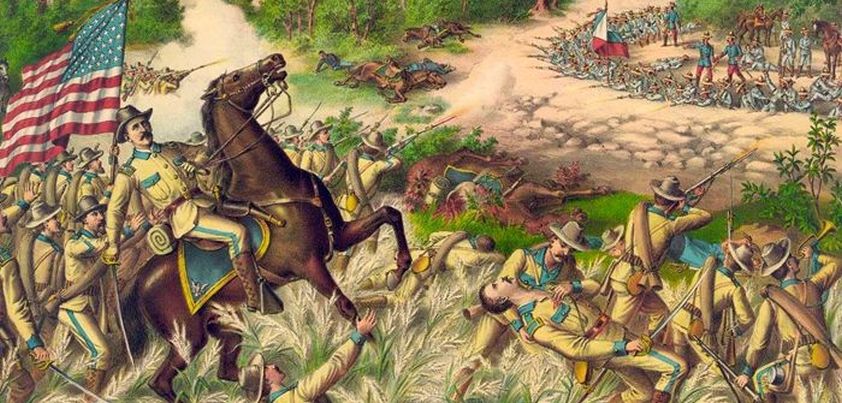 Following Russia’s recent invasion of Ukraine, it seems appropriate to feature one of literature’s most famous “anti-war” stories. Written in 1905, this narrative essay by Samuel Clemens (aka Mark Twain) is a condemnation of the American imperialist agenda that led to the Spanish and Filipino-American Wars. With his usual sarcasm and wit, Twain brushes aside patriotic bravado and poignantly focuses on the suffering of combatants and civilians on both sides. Themes: patriotism, the horrors of war, the connection between the church (religion) and war, the selfish one-sidedness of war prayers vs. the universality of God. More…
Following Russia’s recent invasion of Ukraine, it seems appropriate to feature one of literature’s most famous “anti-war” stories. Written in 1905, this narrative essay by Samuel Clemens (aka Mark Twain) is a condemnation of the American imperialist agenda that led to the Spanish and Filipino-American Wars. With his usual sarcasm and wit, Twain brushes aside patriotic bravado and poignantly focuses on the suffering of combatants and civilians on both sides. Themes: patriotism, the horrors of war, the connection between the church (religion) and war, the selfish one-sidedness of war prayers vs. the universality of God. More…
Death by Scrabble
 You know that a story which begins It’s a hot day and I hate my wife is not going to end well for one of them. In this story by Charlie Fish, a bored couple sit down for a “friendly” game of scrabble. As the competition intensifies, the man notices something strange. The words the couple put down on the board seem to be coming true in the room around them. To test the theory, he puts down the letters Q-U-A-K-E. As the ground begins to shake, he realizes too late that his wife has made the same discovery. More…
You know that a story which begins It’s a hot day and I hate my wife is not going to end well for one of them. In this story by Charlie Fish, a bored couple sit down for a “friendly” game of scrabble. As the competition intensifies, the man notices something strange. The words the couple put down on the board seem to be coming true in the room around them. To test the theory, he puts down the letters Q-U-A-K-E. As the ground begins to shake, he realizes too late that his wife has made the same discovery. More…
Outside
 Etgar Keret’s Outside was published in July, 2020, just over six months into the Covid-19 epidemic. Eighteen months later, we are now into our third wave of the disease. The story is a humorous account of the effects of being locked-down at home. The experience so traumatizes the protagonist that, along with thousands of others, he refuses to leave home when things improve. Forced outside by the army, he struggles to remember where to go and what to do. Fortunately, a chance encounter on the way to an ATM triggers a conditioned response that immediately brings him back to normal. More…
Etgar Keret’s Outside was published in July, 2020, just over six months into the Covid-19 epidemic. Eighteen months later, we are now into our third wave of the disease. The story is a humorous account of the effects of being locked-down at home. The experience so traumatizes the protagonist that, along with thousands of others, he refuses to leave home when things improve. Forced outside by the army, he struggles to remember where to go and what to do. Fortunately, a chance encounter on the way to an ATM triggers a conditioned response that immediately brings him back to normal. More…
My Friend Luke
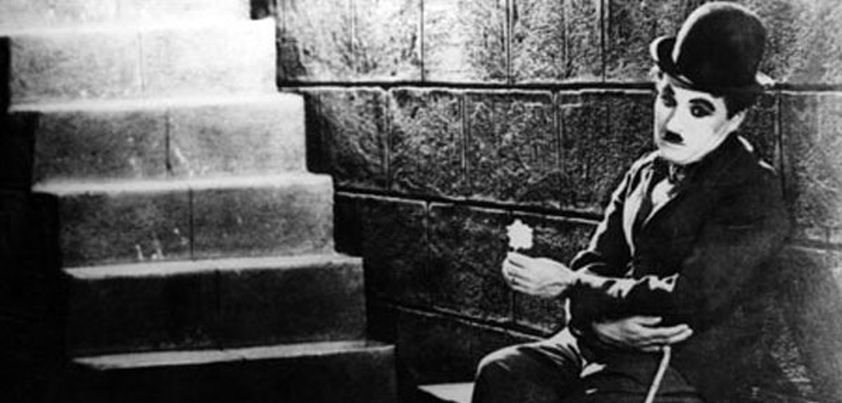 Fernando Sorrentino’s diminutive “friend” Luke is a man of extremes. For the most part he is introverted, considerate and submissive. However, but put Luke on a bus and he becomes assertive, rude and manipulative. The catalyst for this changed behaviour is the tolerance of the other bus passengers, built up over years of coping with a crowded public transport system. The story is a metaphor for the desire of all people living subservient, unsatisfying, exploited lives to lash out and assert their individuality. Themes: lack of fulfilment, loneliness, exploitation, frustration, rebellion. More…
Fernando Sorrentino’s diminutive “friend” Luke is a man of extremes. For the most part he is introverted, considerate and submissive. However, but put Luke on a bus and he becomes assertive, rude and manipulative. The catalyst for this changed behaviour is the tolerance of the other bus passengers, built up over years of coping with a crowded public transport system. The story is a metaphor for the desire of all people living subservient, unsatisfying, exploited lives to lash out and assert their individuality. Themes: lack of fulfilment, loneliness, exploitation, frustration, rebellion. More…
Filboid Studge
 This story is from H.H. Munro (aka Saki)’s Chronicles of Clovis, which follows the exploits of a spoiled, upper-class young man as he causes mischief among Edwardian high society. In the story, Clovis listens as a friend tells how he won and lost the woman he loved by helping her father become very rich. This is a witty, sarcastic spoof on modern advertising. The young character shows great perception in realizing that you can sell the most vile, foul-tasting food by making people feel guilty for not buying it. This is, of course, still true today (think muesli!) More…
This story is from H.H. Munro (aka Saki)’s Chronicles of Clovis, which follows the exploits of a spoiled, upper-class young man as he causes mischief among Edwardian high society. In the story, Clovis listens as a friend tells how he won and lost the woman he loved by helping her father become very rich. This is a witty, sarcastic spoof on modern advertising. The young character shows great perception in realizing that you can sell the most vile, foul-tasting food by making people feel guilty for not buying it. This is, of course, still true today (think muesli!) More…
The Oval Portrait
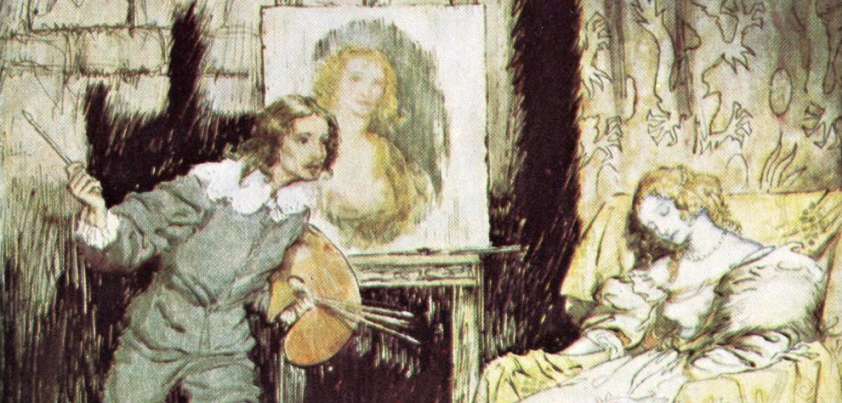 This short Edgar Allan Poe story demonstrates the sinister side of how beauty can live on through art. An injured traveler takes shelter in an empty mountain chateau. There are paintings on and around the walls of his room. On his pillow is a book describing them. His eyes fall on the portrait of a beautiful woman that seems a little too lifelike. Disturbed, he finds its entry in the book. The woman’s story is one of rare beauty, love, obedience, obsession and death. A possible moral: although art can preserve beauty, artistic obsession can destroy it in the making. More…
This short Edgar Allan Poe story demonstrates the sinister side of how beauty can live on through art. An injured traveler takes shelter in an empty mountain chateau. There are paintings on and around the walls of his room. On his pillow is a book describing them. His eyes fall on the portrait of a beautiful woman that seems a little too lifelike. Disturbed, he finds its entry in the book. The woman’s story is one of rare beauty, love, obedience, obsession and death. A possible moral: although art can preserve beauty, artistic obsession can destroy it in the making. More…
The Egg
 Andy Weir’s The Egg is so thought provoking that I have re-read it several times over the years. The story comprises a conversation between “god” and a dead man about the meaning and purpose of life (to grow his soul through new experiences), and his place in the universe. Other themes (equality, consideration for others, and empathy) are nicely summed up in the paragraph: Every time you victimized someone, you were victimizing yourself. Every act of kindness you’ve done, you’ve done to yourself. Every happy and sad moment ever experienced by any human was, or will be, experienced by you. More…
Andy Weir’s The Egg is so thought provoking that I have re-read it several times over the years. The story comprises a conversation between “god” and a dead man about the meaning and purpose of life (to grow his soul through new experiences), and his place in the universe. Other themes (equality, consideration for others, and empathy) are nicely summed up in the paragraph: Every time you victimized someone, you were victimizing yourself. Every act of kindness you’ve done, you’ve done to yourself. Every happy and sad moment ever experienced by any human was, or will be, experienced by you. More…
The Verb to Kill
 Today we have yet another Luisa Valenzuela story prompted by the underlying violence in her world. A major theme is the injustice of harming someone out of fear based on how they look. The protagonist is a pubescent girl in an isolated seaside community. She spends a lot of time collecting clams along the beach with her sister. In the process, they fantasize over the imaginary depraved, murderous activities of a seemingly harmless recluse living nearby. The additional conjugations of “to kill” at the end of the story suggest that the girls may have taken matters into their own hands. More…
Today we have yet another Luisa Valenzuela story prompted by the underlying violence in her world. A major theme is the injustice of harming someone out of fear based on how they look. The protagonist is a pubescent girl in an isolated seaside community. She spends a lot of time collecting clams along the beach with her sister. In the process, they fantasize over the imaginary depraved, murderous activities of a seemingly harmless recluse living nearby. The additional conjugations of “to kill” at the end of the story suggest that the girls may have taken matters into their own hands. More…
The Baby (The First Thing the Baby Did Wrong)
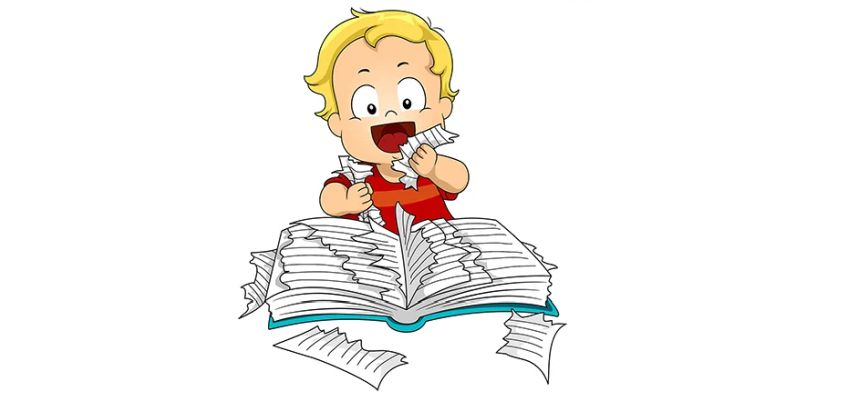 This story by Donald Barthelme may be confronting for some readers because it appears to make light of an example of child abuse. Through exaggeration and humor, Barthelme leads us to his central theme: the coming of a baby can change the whole dynamics of family relationships. Most parents like to think that they are the ones in control. However, all too often they find themselves dancing to their child’s tune. By the end of the story, this baby has totally turned the tables. Some might even say that it has been guilty of a form of parental abuse! More…
This story by Donald Barthelme may be confronting for some readers because it appears to make light of an example of child abuse. Through exaggeration and humor, Barthelme leads us to his central theme: the coming of a baby can change the whole dynamics of family relationships. Most parents like to think that they are the ones in control. However, all too often they find themselves dancing to their child’s tune. By the end of the story, this baby has totally turned the tables. Some might even say that it has been guilty of a form of parental abuse! More…
An Uncomfortable Bed
 This story attributed to Guy de Moupassant is about a man who goes on a hunting holiday with some friends. They are staying in a large country house. When he arrives, the others seem much more jovial than usual. The friends often play practical jokes on one another, so he is suspicious they have planned a trick to play on him. When they all go to bed, he takes great care to make sure that the room contains no traps. He doesn’t find anything, but his friends still have a good laugh at his expense the next day. More…
This story attributed to Guy de Moupassant is about a man who goes on a hunting holiday with some friends. They are staying in a large country house. When he arrives, the others seem much more jovial than usual. The friends often play practical jokes on one another, so he is suspicious they have planned a trick to play on him. When they all go to bed, he takes great care to make sure that the room contains no traps. He doesn’t find anything, but his friends still have a good laugh at his expense the next day. More…
Hearts and Hands
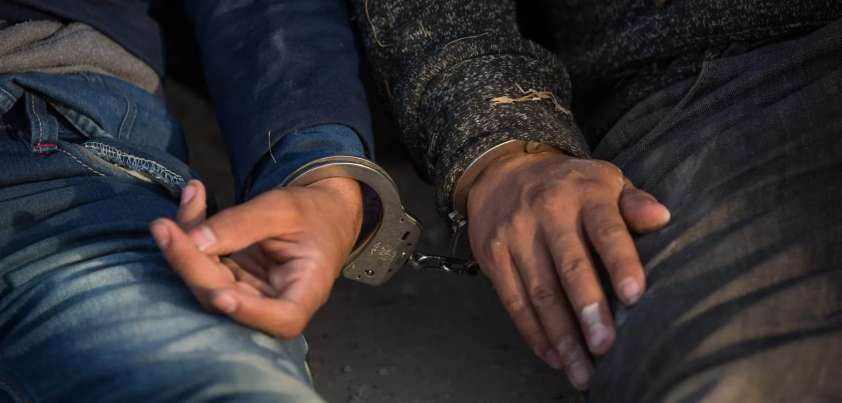 As with many stories by William Porter (aka O. Henry), in Hearts and Hands things are not as they first seem. An attractive, refined-looking young woman is returning East by train after spending time in the ‘Wild West’. She greets a handsome young man she knows, only to see that he is handcuffed to a roughly dressed, glum-faced companion. One of the men is a marshal, the other a criminal being escorted to prison. The themes of the story are understanding and compassion, and that looks can be deceiving. Although we aren’t told, could the woman also be hiding something? More…
As with many stories by William Porter (aka O. Henry), in Hearts and Hands things are not as they first seem. An attractive, refined-looking young woman is returning East by train after spending time in the ‘Wild West’. She greets a handsome young man she knows, only to see that he is handcuffed to a roughly dressed, glum-faced companion. One of the men is a marshal, the other a criminal being escorted to prison. The themes of the story are understanding and compassion, and that looks can be deceiving. Although we aren’t told, could the woman also be hiding something? More…
At Dead Dingo
 This story by Australian poet and writer Henry Lawson takes place in an outback pub one hot New Year’s Day. There are four people in the pub: the girl behind the bar, two customers playing cards, and another on a sofa sleeping off a hangover. When one of the card players loses all his money, he bets what he says is his sheepdog. Shortly after the card players leave, the other man wakes. He asks about his dog and threatens to go to the police unless the hotel pays him in some way. Question: Who really owned the dog? More…
This story by Australian poet and writer Henry Lawson takes place in an outback pub one hot New Year’s Day. There are four people in the pub: the girl behind the bar, two customers playing cards, and another on a sofa sleeping off a hangover. When one of the card players loses all his money, he bets what he says is his sheepdog. Shortly after the card players leave, the other man wakes. He asks about his dog and threatens to go to the police unless the hotel pays him in some way. Question: Who really owned the dog? More…
One of These Days
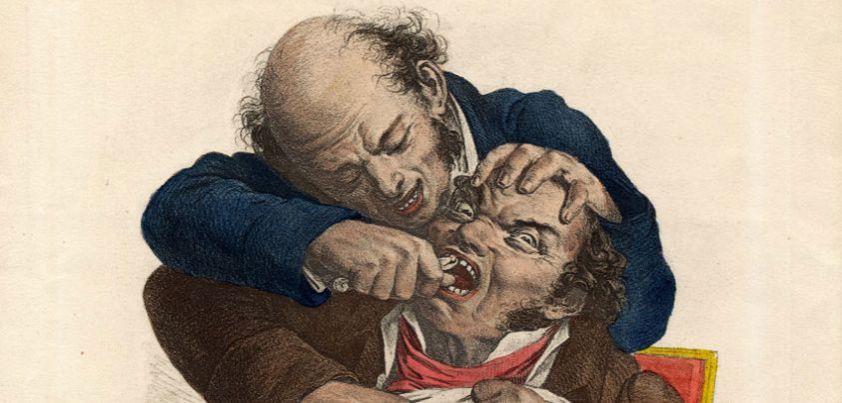 In this story by Gabriel Garcia Marquez, a corrupt Mayor approaches a dentist to treat an abscessed tooth. The dentist does not want to help, but knows he will be killed if he refuses. The dentist has a revolver in a drawer next to his chair. Once the Mayor is in the chair, the dentist has him at his mercy. In a quiet but serious voice, he says to the Mayor: “Now you’ll pay for our twenty dead men.” The dentist has decided what has to be done… does he pull the trigger, or pull the tooth? More…
In this story by Gabriel Garcia Marquez, a corrupt Mayor approaches a dentist to treat an abscessed tooth. The dentist does not want to help, but knows he will be killed if he refuses. The dentist has a revolver in a drawer next to his chair. Once the Mayor is in the chair, the dentist has him at his mercy. In a quiet but serious voice, he says to the Mayor: “Now you’ll pay for our twenty dead men.” The dentist has decided what has to be done… does he pull the trigger, or pull the tooth? More…
The Continuity of Parks
 Julio Cortázar‘s The Continuity of Parks is unusual in that it is a “story within a story” in which the two stories come together. The title stems from the fact that part of the setting of both stories is a park, which we later learn to be the same park at the same time. A tired businessman relaxes with a book. He becomes absorbed in the story (a murder mystery), unaware that the book’s “hero” and “heroine” are nearby planning the same murder he is reading about… and that he is the intended victim! More…
Julio Cortázar‘s The Continuity of Parks is unusual in that it is a “story within a story” in which the two stories come together. The title stems from the fact that part of the setting of both stories is a park, which we later learn to be the same park at the same time. A tired businessman relaxes with a book. He becomes absorbed in the story (a murder mystery), unaware that the book’s “hero” and “heroine” are nearby planning the same murder he is reading about… and that he is the intended victim! More…
The Eyes Have It
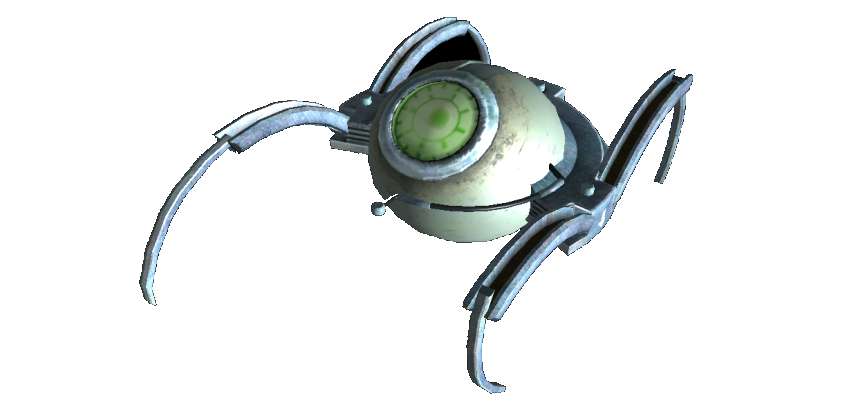 This story by Philip Dick takes a satirical look at the clichéd use of English idioms in popular fiction. Best known as a science fiction writer, Dick makes his point through the eyes of a man who believes he has stumbled upon an invasion of Earth by alien lifeforms that are so highly developed they can shed body parts at will. His story could cause major problems if more people were aware of it. In an age where it takes very little to set off a conspiracy theory, many people could ‘lose their mind’ wondering if it is true. More…
This story by Philip Dick takes a satirical look at the clichéd use of English idioms in popular fiction. Best known as a science fiction writer, Dick makes his point through the eyes of a man who believes he has stumbled upon an invasion of Earth by alien lifeforms that are so highly developed they can shed body parts at will. His story could cause major problems if more people were aware of it. In an age where it takes very little to set off a conspiracy theory, many people could ‘lose their mind’ wondering if it is true. More…
Reunion
 John Cheever’s Reunion is about a boy (Charlie) who reaches out to meet his estranged father, only to learn that the man is a rude, possibly alcoholic attention-seeker who delights in putting other people down. Before the meeting, Charlie was curious to see what his father was like: he was my father, my flesh and blood, my future and my doom. I knew that when I was grown I would be something like him. In cutting the reunion short, Charlie shows that he has the power to defy nature and avoid following in his father’s footsteps. More…
John Cheever’s Reunion is about a boy (Charlie) who reaches out to meet his estranged father, only to learn that the man is a rude, possibly alcoholic attention-seeker who delights in putting other people down. Before the meeting, Charlie was curious to see what his father was like: he was my father, my flesh and blood, my future and my doom. I knew that when I was grown I would be something like him. In cutting the reunion short, Charlie shows that he has the power to defy nature and avoid following in his father’s footsteps. More…
Everyone Cried
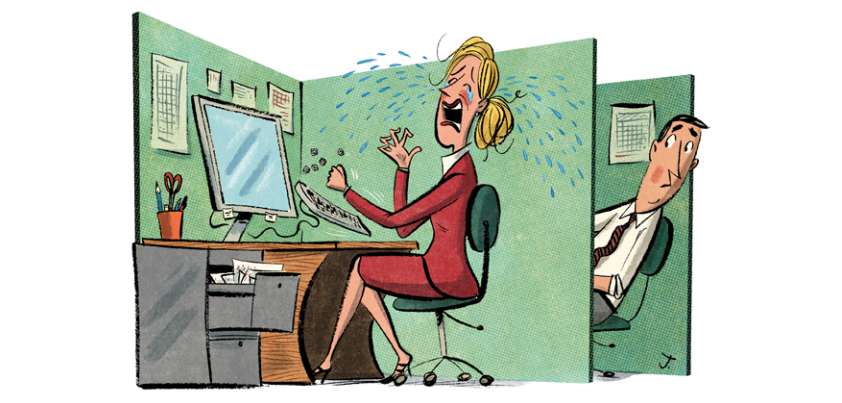 This story from Lydia Davis is sad enough to make you want to cry. It paints a bleak picture of how our lives are dominated by the little things that go wrong, and how these can lead to depression and tears. Some respite may come at the end of the day, but only if things are going well at home. Most of the story is told in the past tense, about a time when I was young. Does this imply that as we get older we become so accustomed to these daily frustrations that they don’t bother us as much? More…
This story from Lydia Davis is sad enough to make you want to cry. It paints a bleak picture of how our lives are dominated by the little things that go wrong, and how these can lead to depression and tears. Some respite may come at the end of the day, but only if things are going well at home. Most of the story is told in the past tense, about a time when I was young. Does this imply that as we get older we become so accustomed to these daily frustrations that they don’t bother us as much? More…
Dead Men’s Path
 The major theme of Chinua Achebe’s Dead Men’s Path is cultural conflict. Set in a rural Nigerian mission school, the story takes place in 1949 when the country was still under British rule. The conflict emerges when a new headmaster, full of reformist zeal, objects to local villagers walking through school grounds to access a path that is important to their animist beliefs. It is ironic that, being Nigerian, the young headmaster failed to grasp the seriousness of the villagers’ concerns, whereas his “white Supervisor” seems to have immediately developed an understanding of and appreciation for their situation. More…
The major theme of Chinua Achebe’s Dead Men’s Path is cultural conflict. Set in a rural Nigerian mission school, the story takes place in 1949 when the country was still under British rule. The conflict emerges when a new headmaster, full of reformist zeal, objects to local villagers walking through school grounds to access a path that is important to their animist beliefs. It is ironic that, being Nigerian, the young headmaster failed to grasp the seriousness of the villagers’ concerns, whereas his “white Supervisor” seems to have immediately developed an understanding of and appreciation for their situation. More…
The First Law
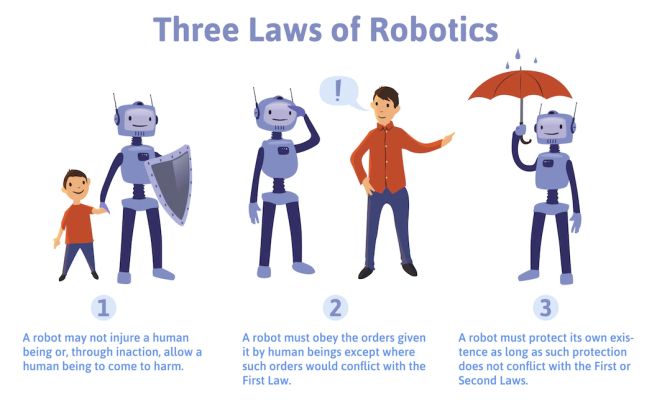 In this story by Isaac Asimov, a group of scientists are astounded when a colleague relates how a new model robot disobeyed the first and most fundamental of the Three Laws of Robotics: a robot may not injure a human being, or through inaction allow a human being to come to harm. The story is set on Titan, the largest moon of Saturn. The robot, especially designed to navigate in Titan’s deadly zero-visibility storms, leaves the protagonist to die in one of them. Although the robot had a legitimate reason for its actions, the new model was discontinued immediately. More…
In this story by Isaac Asimov, a group of scientists are astounded when a colleague relates how a new model robot disobeyed the first and most fundamental of the Three Laws of Robotics: a robot may not injure a human being, or through inaction allow a human being to come to harm. The story is set on Titan, the largest moon of Saturn. The robot, especially designed to navigate in Titan’s deadly zero-visibility storms, leaves the protagonist to die in one of them. Although the robot had a legitimate reason for its actions, the new model was discontinued immediately. More…
Christmas Day in the Morning
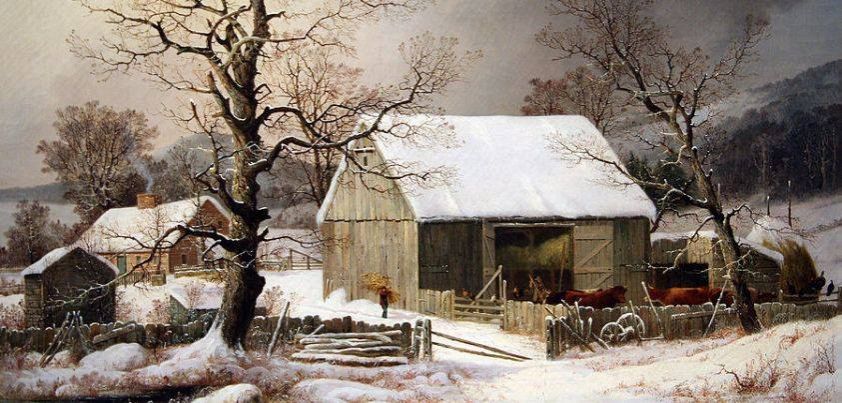 This coming of age story by Pearl S. Buck tells how doing something special to show how much you love someone can be the greatest gift of all. An old man wakes early one Christmas morning and remembers another Christmas when, as a boy, he first understood how much his father loved him. He decided that the cheap tie he had bought was not good enough, and came up with another gift they both remember for the rest of their lives. He realizes that love alone awakens love and decides to give the gift again. Themes: nostalgia, love, family, giving. More…
This coming of age story by Pearl S. Buck tells how doing something special to show how much you love someone can be the greatest gift of all. An old man wakes early one Christmas morning and remembers another Christmas when, as a boy, he first understood how much his father loved him. He decided that the cheap tie he had bought was not good enough, and came up with another gift they both remember for the rest of their lives. He realizes that love alone awakens love and decides to give the gift again. Themes: nostalgia, love, family, giving. More…
Counterfeit Bills
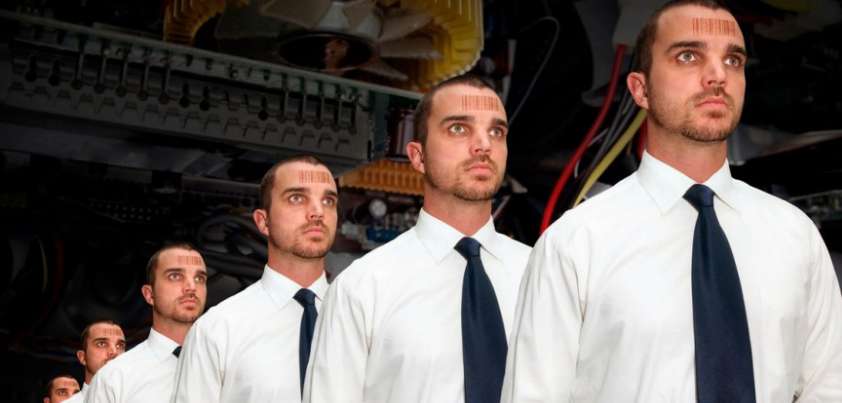 Richard Matheson is renowned for his novels and traditional short stories in the fantasy, horror and science fiction genres. This is one of his few published flash stories, and the fact that it is a spoof of the science fiction cloning model makes it especially interesting. The story is based on the premise of how nice it would be to have a ‘double’ to carry out all the mundane tasks in your life, so you could spend all your time going out and having fun. Despite (or perhaps thanks to) the corny puns, it is a very enjoyable Quick Read. More…
Richard Matheson is renowned for his novels and traditional short stories in the fantasy, horror and science fiction genres. This is one of his few published flash stories, and the fact that it is a spoof of the science fiction cloning model makes it especially interesting. The story is based on the premise of how nice it would be to have a ‘double’ to carry out all the mundane tasks in your life, so you could spend all your time going out and having fun. Despite (or perhaps thanks to) the corny puns, it is a very enjoyable Quick Read. More…
The Romance of a Busy Broker
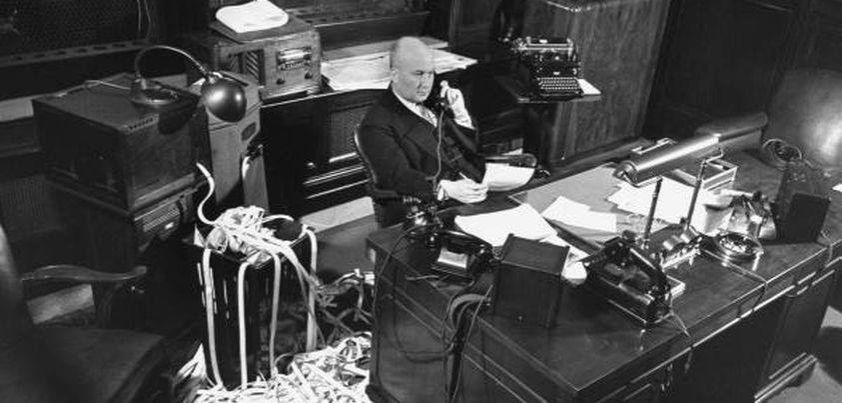 This title of this humorous but unlikely story by William Porter (aka O. Henry) might be a clever play on words. The setting is the office of Harvey Maxwell, a busy New York stockbroker, over the space of a single morning. When Harvey sits down at his desk, it is as if he changes from a man into a machine. He puts everything else out of his mind. It is a bad day on the stock market and, when things get quieter at lunchtime, he realizes that he has forgotten something more important than making money. More…
This title of this humorous but unlikely story by William Porter (aka O. Henry) might be a clever play on words. The setting is the office of Harvey Maxwell, a busy New York stockbroker, over the space of a single morning. When Harvey sits down at his desk, it is as if he changes from a man into a machine. He puts everything else out of his mind. It is a bad day on the stock market and, when things get quieter at lunchtime, he realizes that he has forgotten something more important than making money. More…
Voodoo
 In this flash story, Fredric Brown explores the use of black magic to solve a marriage problem. Mr and Mrs Decker have decided on a divorce. Love has turned to hate, and the break-up is not friendly. The biggest issue they need to agree on is the financial settlement. Mrs Decker wants half of everything; Mr Decker thinks this is too much. She knows voodoo, and tells him she could use it to kill and him and get everything if he didn’t agree. This leads to an all-or-nothing bet where, if her voodoo doesn’t kill him, he keeps it all. More…
In this flash story, Fredric Brown explores the use of black magic to solve a marriage problem. Mr and Mrs Decker have decided on a divorce. Love has turned to hate, and the break-up is not friendly. The biggest issue they need to agree on is the financial settlement. Mrs Decker wants half of everything; Mr Decker thinks this is too much. She knows voodoo, and tells him she could use it to kill and him and get everything if he didn’t agree. This leads to an all-or-nothing bet where, if her voodoo doesn’t kill him, he keeps it all. More…
The Wave
 The only “characters” in this vignette from Liam O’Flaherty are a cliff, waves, and “the wave”. Major themes include permanence, time, the power of nature/many. O’Flaherty was a noted Republican, and the story can be looked upon as a powerful allegory of Ireland’s struggle for independence. The cliff (Britain) stands firm and resolute, having successfully weathered many storms over its long history. Individually, the smaller waves (the Irish people) make little impression against its rocky walls. Working together, and combining to form “the wave”, they have enough power to begin breaking down the mighty cliff. More…
The only “characters” in this vignette from Liam O’Flaherty are a cliff, waves, and “the wave”. Major themes include permanence, time, the power of nature/many. O’Flaherty was a noted Republican, and the story can be looked upon as a powerful allegory of Ireland’s struggle for independence. The cliff (Britain) stands firm and resolute, having successfully weathered many storms over its long history. Individually, the smaller waves (the Irish people) make little impression against its rocky walls. Working together, and combining to form “the wave”, they have enough power to begin breaking down the mighty cliff. More…
The End of Something / Three-Day Blow
 These two Ernest Hemingway should ideally be read together as they are linked by storyline (the end of a relationship) and theme (change). The lumber town of Hortons Bay has died and its people have left because all the old-growth trees have been cut down. Like the townspeople, Nick Adams is planning a new beginning. He has decided to break up with girlfriend Marjorie, telling her “it isn’t fun anymore”. We learn the reason in the second story, where we are introduced to the additional themes of class and/or racial prejudice, selfish mateship and regret. More…
These two Ernest Hemingway should ideally be read together as they are linked by storyline (the end of a relationship) and theme (change). The lumber town of Hortons Bay has died and its people have left because all the old-growth trees have been cut down. Like the townspeople, Nick Adams is planning a new beginning. He has decided to break up with girlfriend Marjorie, telling her “it isn’t fun anymore”. We learn the reason in the second story, where we are introduced to the additional themes of class and/or racial prejudice, selfish mateship and regret. More…
The Snow Child
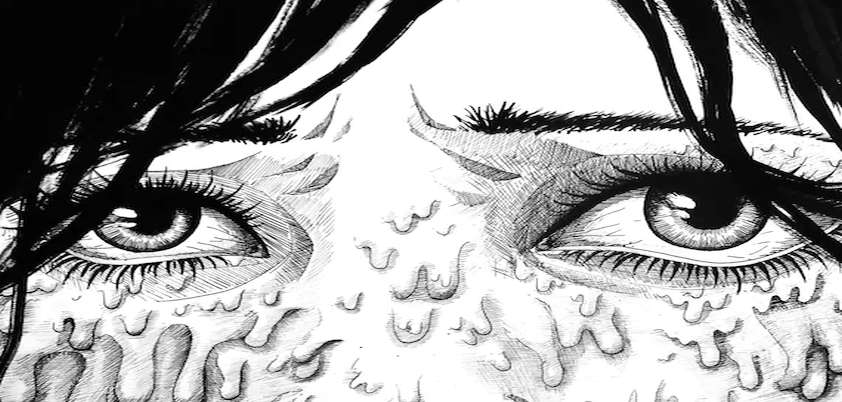 The main theme of Angela Carter’s Snow Child is feminist gender stereotyping. There are no heroes here. A powerful, dominating and lustful Count humiliates his wife by wishing for a young girl and clothing her in the vain Countess’s furs. His masculinity and dignity are then stripped away as he weeps while defiling the child’s dead body. The usually submissive Countess experiences a moment of power as the Count guiltily hands her the rose that killed the child. This passes when a thorn prick fails to kill her, proving that she lacks the sweet innocence of the snow child. More…
The main theme of Angela Carter’s Snow Child is feminist gender stereotyping. There are no heroes here. A powerful, dominating and lustful Count humiliates his wife by wishing for a young girl and clothing her in the vain Countess’s furs. His masculinity and dignity are then stripped away as he weeps while defiling the child’s dead body. The usually submissive Countess experiences a moment of power as the Count guiltily hands her the rose that killed the child. This passes when a thorn prick fails to kill her, proving that she lacks the sweet innocence of the snow child. More…
Powder
 This story from Tobias Wolff explores the relationship between a boy and his father at a time when his parent’s marriage is failing. The two have very different personalities. The boy is conservative and super-organized; the father carefree and irresponsible with little regard for rules. In order to return his son home from a skiing holiday in time for Christmas, the father disregards a police barrier and attempts a dangerous drive down a mountain in heavy snow. The boy shares a moment of bonding with his father as he uncharacteristically decides to ignore the potential consequences and enjoy the experience. More…
This story from Tobias Wolff explores the relationship between a boy and his father at a time when his parent’s marriage is failing. The two have very different personalities. The boy is conservative and super-organized; the father carefree and irresponsible with little regard for rules. In order to return his son home from a skiing holiday in time for Christmas, the father disregards a police barrier and attempts a dangerous drive down a mountain in heavy snow. The boy shares a moment of bonding with his father as he uncharacteristically decides to ignore the potential consequences and enjoy the experience. More…
The Answer is No
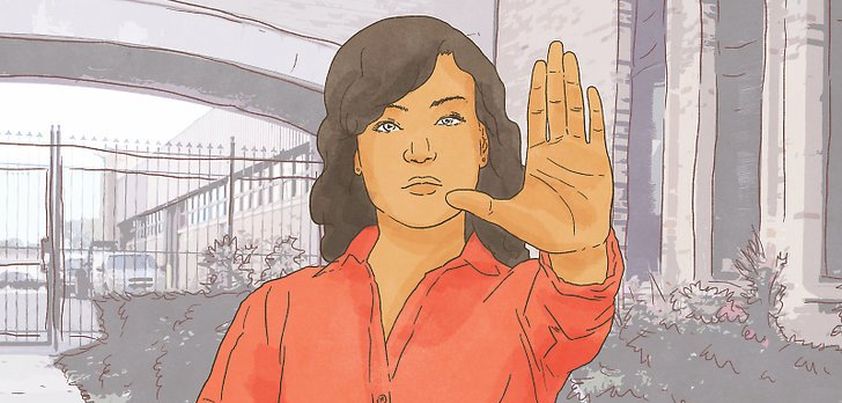 This story explores the dilemma of a teacher who, having been raped by a trusted tutor at fourteen years of age, must face the attacker again as her school’s new headmaster. She refuses to cower before the man, and manages to maintain her dignity and self-respect through two encounters. Naguib Mahfouz is one of the few Islamic writers with the reputation to be able to not only successfully take on such a confronting issue, but also present it from an openly feminist perspective. Themes: abuse of trust, sexual assault, strength of character, courage, empowerment. More…
This story explores the dilemma of a teacher who, having been raped by a trusted tutor at fourteen years of age, must face the attacker again as her school’s new headmaster. She refuses to cower before the man, and manages to maintain her dignity and self-respect through two encounters. Naguib Mahfouz is one of the few Islamic writers with the reputation to be able to not only successfully take on such a confronting issue, but also present it from an openly feminist perspective. Themes: abuse of trust, sexual assault, strength of character, courage, empowerment. More…
Popular Mechanics (Mine / Little Things)
 As anyone who has witnessed an acrimonious divorce knows, sometimes demands over property settlement and custody of children defy logic. This is often because discussions are driven by anger and a desire to hurt or “get back at” the other party as opposed to fairness and what is best for all. In this short story by Raymond Carver, the only major point of argument seems to be which parent will be the main carer for the couple’s baby. Unfortunately, the simple mechanics of a newly formed human body lead to a “Solomon-like” solution that will not please either of them. More…
As anyone who has witnessed an acrimonious divorce knows, sometimes demands over property settlement and custody of children defy logic. This is often because discussions are driven by anger and a desire to hurt or “get back at” the other party as opposed to fairness and what is best for all. In this short story by Raymond Carver, the only major point of argument seems to be which parent will be the main carer for the couple’s baby. Unfortunately, the simple mechanics of a newly formed human body lead to a “Solomon-like” solution that will not please either of them. More…
The New Food
 The climax of this very short story is the gruesome death of an imaginary baby. If you did not know who wrote it, you might attribute the plot to the playful, postmodernist style of an author like Donald Barthelme. In fact, the story was published way back in 1910. It comes from Canadian humorist Stephen Leacock’s first short story collection, Literary Lapses. A fascinating aspect of the story is its modern relevance. Viewed in the context of today’s world, the story is a wonderful satire of heavily processed convenience foods and the contribution they make towards child obesity. More…
The climax of this very short story is the gruesome death of an imaginary baby. If you did not know who wrote it, you might attribute the plot to the playful, postmodernist style of an author like Donald Barthelme. In fact, the story was published way back in 1910. It comes from Canadian humorist Stephen Leacock’s first short story collection, Literary Lapses. A fascinating aspect of the story is its modern relevance. Viewed in the context of today’s world, the story is a wonderful satire of heavily processed convenience foods and the contribution they make towards child obesity. More…
The Extravagant Behavior of the Naked Woman
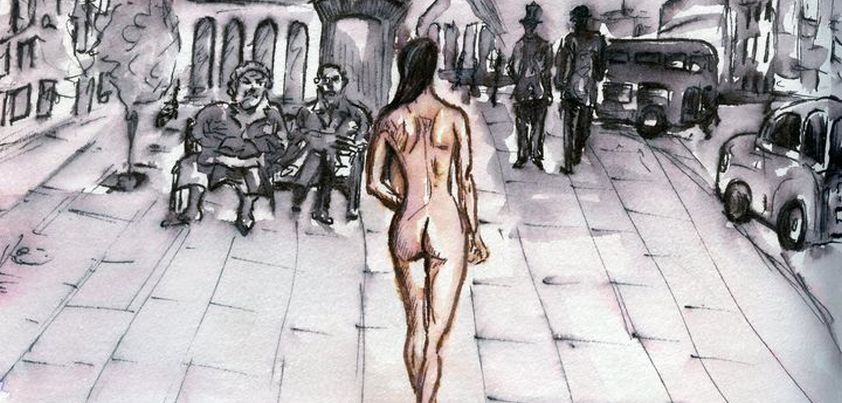 This very short story from Josefina Estrada appears in several international flash fiction anthologies. Its shock value helps to get across a number of important themes. Some are stated or can readily be implied: the woman is clearly suffering some sort of mental condition, but the community and police do not have access to services or facilities to help her. Other than a few lustful men, it is easier to turn away and pretend she does not exist. A less obvious theme lies in the question: What would happen if it were a wild-looking man walking naked through the streets? More…
This very short story from Josefina Estrada appears in several international flash fiction anthologies. Its shock value helps to get across a number of important themes. Some are stated or can readily be implied: the woman is clearly suffering some sort of mental condition, but the community and police do not have access to services or facilities to help her. Other than a few lustful men, it is easier to turn away and pretend she does not exist. A less obvious theme lies in the question: What would happen if it were a wild-looking man walking naked through the streets? More…
Rex Ex Machina
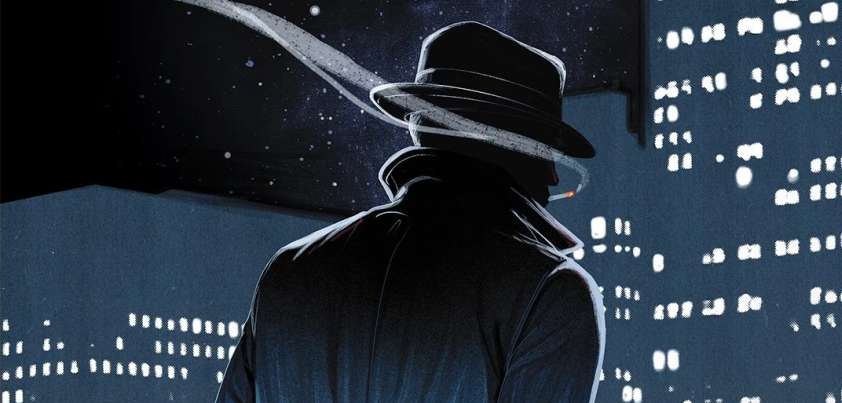 The Latin phrase used as the title of this story by Frederic Max gives away a little about the plot. Rex Ex Machina translates as King from Machine. The story comprises a letter from a dying man to his only son. There is nothing at all sentimental about the letter… the word “love” isn’t even mentioned! Rather, it explains something that the man has been hiding from his son for almost forty years. It tells how he had once trained as a spy and been sent on a top-secret mission to destroy a machine that threatened the free world. More…
The Latin phrase used as the title of this story by Frederic Max gives away a little about the plot. Rex Ex Machina translates as King from Machine. The story comprises a letter from a dying man to his only son. There is nothing at all sentimental about the letter… the word “love” isn’t even mentioned! Rather, it explains something that the man has been hiding from his son for almost forty years. It tells how he had once trained as a spy and been sent on a top-secret mission to destroy a machine that threatened the free world. More…
The School
 Strange things are happening in the school featured in this story by Donald Barthelme. First, all plants and animals in student projects die. Death seems to be everywhere when an adopted dog, sponsored Korean orphan, and higher than average numbers of parents pass on. Then, to cap it all off, two students are killed in an accident while playing on a building site. In order to experience renewal of life, students ask their teacher to demonstrate sex with his teaching assistant. But just as they kiss and things start to get interesting, something happens that makes the children cheer wildly. More…
Strange things are happening in the school featured in this story by Donald Barthelme. First, all plants and animals in student projects die. Death seems to be everywhere when an adopted dog, sponsored Korean orphan, and higher than average numbers of parents pass on. Then, to cap it all off, two students are killed in an accident while playing on a building site. In order to experience renewal of life, students ask their teacher to demonstrate sex with his teaching assistant. But just as they kiss and things start to get interesting, something happens that makes the children cheer wildly. More…
The Chaser
 On the surface, John Collier’s The Chaser is a light-hearted story about a young man looking to buy a love potion to enchant the woman of his dreams. However, in the old man’s final words Au revoir (goodbye until we meet again), we realize that the story may be the rising action in a longer plot. A major theme is manipulation. Alan is being as cruelly manipulated as he hopes to manipulate Diana. Other themes: true love vs. obsessive desire, equality vs. servility in relationships, morality (lack of respect for and destruction of Diana’s identity, murder as a solution). More…
On the surface, John Collier’s The Chaser is a light-hearted story about a young man looking to buy a love potion to enchant the woman of his dreams. However, in the old man’s final words Au revoir (goodbye until we meet again), we realize that the story may be the rising action in a longer plot. A major theme is manipulation. Alan is being as cruelly manipulated as he hopes to manipulate Diana. Other themes: true love vs. obsessive desire, equality vs. servility in relationships, morality (lack of respect for and destruction of Diana’s identity, murder as a solution). More…
Parallel Universes
 The title of this Etgar Keret story describes his writing, which takes readers on humorous, often shocking journeys to worlds so absurd they could only exist outside our own. Keret developed a special interest in parallel universe theory when told that thinking about them helped his father get through the privations of Jewish persecution in World War 2 Europe. Although Parallel Universes fits the Keret mould in terms of the absurd contrasts between the described worlds, it is also a poignant love story that ends: I enjoy knowing there’s one place … where I’m falling asleep happy. More…
The title of this Etgar Keret story describes his writing, which takes readers on humorous, often shocking journeys to worlds so absurd they could only exist outside our own. Keret developed a special interest in parallel universe theory when told that thinking about them helped his father get through the privations of Jewish persecution in World War 2 Europe. Although Parallel Universes fits the Keret mould in terms of the absurd contrasts between the described worlds, it is also a poignant love story that ends: I enjoy knowing there’s one place … where I’m falling asleep happy. More…
A Face in the Dark
 The power of this very short horror story from Ruskin Bond is in the way the events described mirror what one might experience in a nightmare. As an alternative to supernatural forces, Bond cleverly presents a logical explanation for the night’s events: the way faces can appear ghostly by torchlight. Either way, the major theme of the story is fear when confronted with the unknown. A possible moral is that we shouldn’t judge people who look or dress differently due to their race, class, gender identity, religion, etc. Other themes: the supernatural, imagination vs. reality. More…
The power of this very short horror story from Ruskin Bond is in the way the events described mirror what one might experience in a nightmare. As an alternative to supernatural forces, Bond cleverly presents a logical explanation for the night’s events: the way faces can appear ghostly by torchlight. Either way, the major theme of the story is fear when confronted with the unknown. A possible moral is that we shouldn’t judge people who look or dress differently due to their race, class, gender identity, religion, etc. Other themes: the supernatural, imagination vs. reality. More…
Oysters
 Anton Chekhov wrote hundreds of short, humorous stories like this one to put himself through medical school. A young boy, who is so weak from hunger that he can barely stand, sees a sign in a restaurant advertising oysters. He knows that oysters are some kind of seafood. However, he does not know what they look like. In his hunger-affected state, the boy imagines himself eating creatures half-way between a crab and a frog. He then pictures himself eating up everything around him. He suddenly comes back to earth when two rich “gentlemen” agree to introduce him to real oysters. More…
Anton Chekhov wrote hundreds of short, humorous stories like this one to put himself through medical school. A young boy, who is so weak from hunger that he can barely stand, sees a sign in a restaurant advertising oysters. He knows that oysters are some kind of seafood. However, he does not know what they look like. In his hunger-affected state, the boy imagines himself eating creatures half-way between a crab and a frog. He then pictures himself eating up everything around him. He suddenly comes back to earth when two rich “gentlemen” agree to introduce him to real oysters. More…
Cat in the Rain
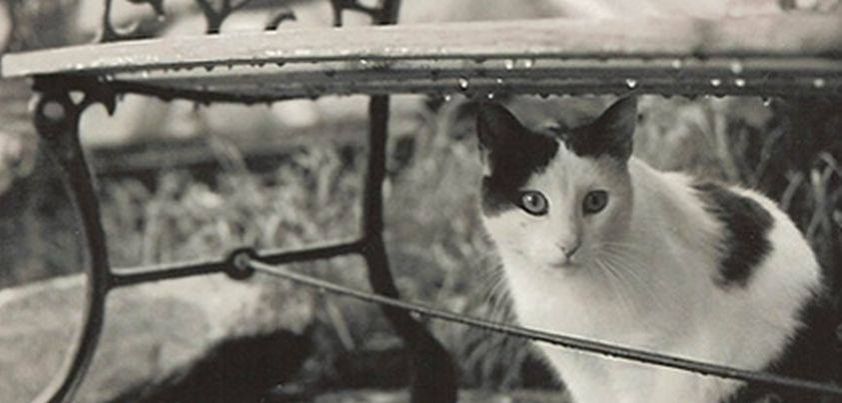 On the surface, this story by Ernest Hemingway is a simple tale about a couple spending a rainy afternoon in a hotel room during an Italian holiday. The woman feels pity for a cat she sees trying to stay dry under an outside table. Readers often interpret this as a symbol of the woman feeling trapped in an empty relationship. Does the problem between the couple arise from having no common interests because of their age difference, a lack of love for the woman on the part of the man, or the woman’s childishness and greed? More…
On the surface, this story by Ernest Hemingway is a simple tale about a couple spending a rainy afternoon in a hotel room during an Italian holiday. The woman feels pity for a cat she sees trying to stay dry under an outside table. Readers often interpret this as a symbol of the woman feeling trapped in an empty relationship. Does the problem between the couple arise from having no common interests because of their age difference, a lack of love for the woman on the part of the man, or the woman’s childishness and greed? More…